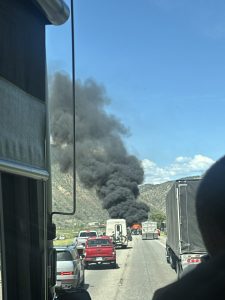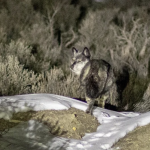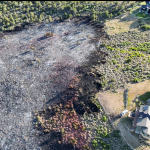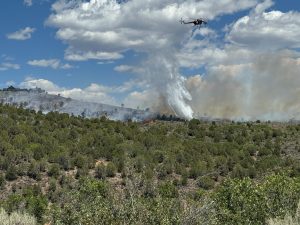Conservationists urge the public to disinfect all river gear after use, including waders, paddle boards, and kayaks

Robyn Draheim/Center for Lakes and Reservoirs
As summer draws more people to Colorado’s rivers and reservoirs, conservationists are urging the public to take immediate action to protect waterways from invasive aquatic species.
The threat is both serious and irreversible, and the solution is straightforward: clean, drain, and dry your gear. Every time.
Aquatic Nuisance Species (ANS) — such as zebra mussels, rusty crayfish, quagga mussels, New Zealand mud snails, and invasive aquatic plants — have already caused lasting damage to rivers and lakes across the state.
These species often go unnoticed — some are microscopic and capable of surviving for days in damp environments, making it easy for them to hitch a ride on fishing gear, boats, paddleboards, or even inside the eyelets of waders.

“Once a river or reservoir has an Aquatic Nuisance Species in it, it’s nearly impossible to eradicate. In almost all cases, this isn’t treatable or even fixable,” said Rick Lofaro, executive director of Roaring Fork Conservancy. “It becomes a permanent problem that will cost taxpayers and local water users, and officials an incredible amount of time and money.”
Christina Medved, director of community outreach for the Roaring Fork Conservancy, emphasized how close to home the risk already is.
“Zebra mussels, New Zealand mud snails, and quagga mussels have all been found close by,” Medved said. “It’s so important for people to clean their gear. Some of these species, like the mud snails, can hide within the eyelet on waders. That is how small some of these species can be.”
She warned that infestations aren’t just inconvenient — they’re permanent and expensive.
“The concern is that if these species get into the infrastructure, there is no way to eradicate them,” she said. “If something like this gets in Ruedi Reservoir — which many people don’t know powers a hydroelectric dam — these mussels and snails coat everything to the point where nothing works.”
Kayaks, paddleboards, and other watercraft are of particular concern.
“People are not used to having kayaks and stand-up paddle boards being inspected and disinfected, but they should,” Medved said. “Kayaks hold on to water. If you do not let your paddle board sit in the sun and get nice and dry, you are just wrapping them back up, sticking them in your bag, and many of those species can survive for days in that type of environment.”

To counter the growing threat, the Roaring Fork Conservancy has teamed up with Colorado Parks and Wildlife and the Ruedi Water and Power Authority to promote responsible water use.
New gear-cleaning stations are now available at Frying Pan Anglers and Taylor Creek Fly Shop in Basalt, and the Carbondale Boat Ramp features its first-ever boat cleaning station. Boat inspections also continue at Ruedi Reservoir.
These services are free and designed to be easy to use.
“Disinfecting gear is a quick thing that can be done at a disinfecting station, or even with hot water, and is a thing people need to start making a habit of,” Medved said. “If you’re going to be a river steward and a river user, this is another thing you should be doing. We should have been doing this all along.”

Lofaro likened it to routine camping behavior.
“It’s the same idea as putting your gear away after camping, especially with your kitchen kit,” he said. “You clean your pots and pans, utensils, plates, and frying pans because you do not want to have dirty gear the next time you go out. This is the same idea but with your fishing and boating gear, and it just becomes second nature.”
He said the time for half-measures is over.
“This is that big of a deal,” he said. “It’s time for people to participate 100%.”
For more information about the Aquatic Nuisance Species Program, gear-cleaning tips, and maps of disinfecting stations, visit cpw.state.co.us/aquatic-nuisance-species-program or roaringfork.org.

Support Local Journalism

Support Local Journalism
Readers around Glenwood Springs and Garfield County make the Post Independent’s work possible. Your financial contribution supports our efforts to deliver quality, locally relevant journalism.
Now more than ever, your support is critical to help us keep our community informed about the evolving coronavirus pandemic and the impact it is having locally. Every contribution, however large or small, will make a difference.
Each donation will be used exclusively for the development and creation of increased news coverage.









